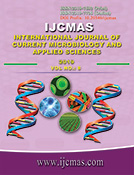


 National Academy of Agricultural Sciences (NAAS)
National Academy of Agricultural Sciences (NAAS)

|
PRINT ISSN : 2319-7692
Online ISSN : 2319-7706 Issues : 12 per year Publisher : Excellent Publishers Email : editorijcmas@gmail.com / submit@ijcmas.com Editor-in-chief: Dr.M.Prakash Index Copernicus ICV 2018: 95.39 NAAS RATING 2020: 5.38 |
Hepatitis B virus (HBV) infection is a serious global health problem affecting two billion people worldwide, and 350 million people suffer from chronic HBV infection. In India Hepatitis B surface antigen (HBsAg) is used as the sole marker to check safety of blood transfusion as well as antenatal screening of mothers to prevent transmission of infection to newborn. Despite mandatory screening for HBsAg by Enzyme Linked Immuno Sorbent Assay (ELISA) or similar tests, transfusion-associated HBV (TAHBV) continues to be a major problem in India, more so in patients receiving repeated transfusions. Present study was undertaken to detect the presence of occult hepatitis B (OBI) infections in normal healthy adult population which go undetected by routine HBsAg screen and to ascertain whether HBsAg test alone is enough as a screening test to prevent hepatitis transmission to recipient after blood transfusion and to newborn from infected mother. A total of 1421 serum samples collected from HBsAg-negative healthy adults (18 to 50 years of age) were tested for the presence of antibodies to hepatitis B core antigen (anti-HBc). All samples reactive for anti-HBc antibody were then investigated for presence of anti-HBs. Anti-HBc positive samples with antibodies to HBs antigen (anti-HBs) titres<10 mIU/mL were considered potentially infectious for HBV. Out of 1421 samples tested, 163 (11.5%) blood samples were found to be reactive for anti-HBc. 58 out of these 163 (35.6%) samples were non-reactive for anti-HBs (<10mIU/mL). Overall 4.1% of HBsAg negative blood was found to be potentially infectious for transmitting HBV. The positivity rate of Occult hepatitis infection was double in males (6.81%) as compared to females (3.81%). Keeping in view high rate of occult hepatitis infection in HBs antigen negative blood, we suggest routine anti-HBc screening of blood with anti-HBc and further testing of anti-HBc positive blood either for anti-HBs or HBV DNA to ensure safety of blood transfusion and prevent perinatal transmission to newborn.
 |
 |
 |
 |
 |